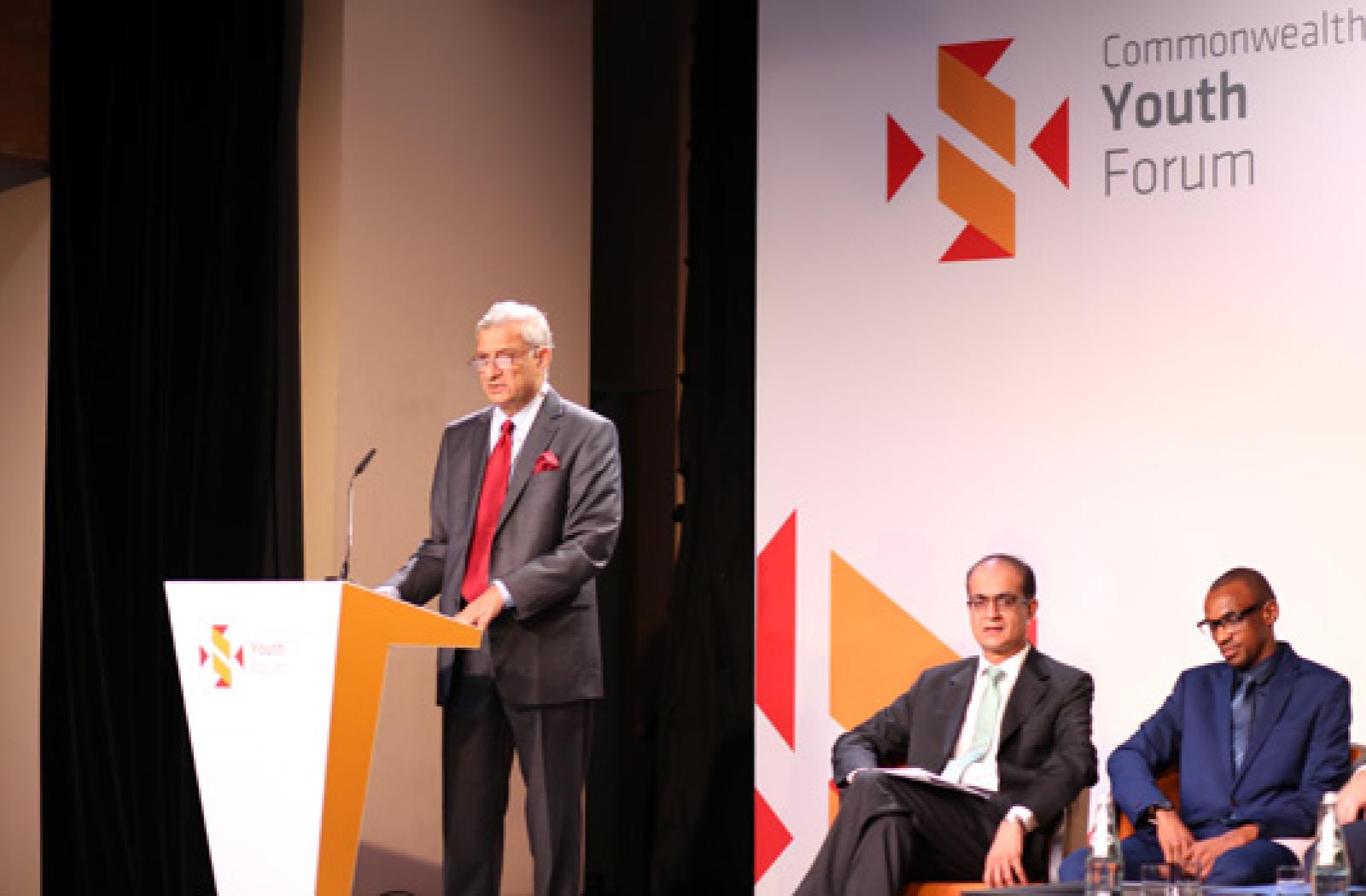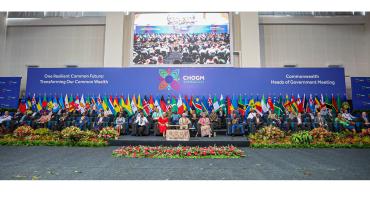Commonwealth Youth Forum 2015 – Opening Ceremony Theme: Adding Global Value…#WhatNext? Remarks by Commonwealth Secretary-General Kamalesh Sharma.

Prime Minister, Honourable Ministers, distinguished guests, youth delegates, Commonwealth friends…
At every Commonwealth summit the Youth Forum brings immense dynamism and energy. It is a hive of activity, buzzing with ideas and ambition. It takes on even greater significance in this year when our overarching Commonwealth theme celebrates ‘A Young Commonwealth’.
Participants in this Forum are standard bearers for the 1.2 billion young people living in the Commonwealth, and the youth in all our member states. You have a leading role in setting our agenda for collective practical action - particularly in 2015 when the world has defined a new development framework and set fresh Global Goals for Sustainable Development.
Your insights and commitment will drive development and democracy. Your community contacts will promote tolerance, respect and understanding. By linking grassroots activism, and high level engagement, this Forum is the fountainhead for a Commonwealth cascade of youth empowerment.
This dynamism is acknowledged in the Commonwealth Charter, adopted three years ago by Heads of Government on behalf of the people of all our member states. Article 13 headed ‘Importance of Young People in the Commonwealth’ recognises that the future success of the Commonwealth rests with the continued commitment and contributions of young people in promoting and sustaining the Commonwealth and its values and principles.
In adopting the Charter, our member states also committed to investing in and promoting the development of young people, particularly through the creation of opportunities for youth employment and entrepreneurship.
We take these commitments very seriously; they are far more than slogans or good intentions. We lead the world with a highly significant Commonwealth ‘first’, our Youth Development Index – launched in 2013. This pioneering tool enables governments, decision-makers and stakeholders to identify and learn from areas of success, pinpoint priority investment areas, and monitor progress over time. It tracks youth development across five areas: education, health, employment, civic participation, and political participation.
The Index is raising awareness both of successes and of investment needs – of time, money, and attention required - and helping us to be aware of, and to share good practices to the benefit of all. It directly informs the Commonwealth Plan of Action for Youth Empowerment by providing the base of evidence for member countries of the Commonwealth to assess where they are doing well in youth development and where there is need for greater focus and attention.
Our Commonwealth approach considers you, our young people, as being empowered when you know you can create choices in life, are aware of the implications of those choices, make informed decisions freely, take actions based on those decisions, and accept responsibility for the consequences of these actions.
Empowering you means creating and supporting what we call ‘enabling conditions’, under which you can act on your own behalf, and on your own terms, rather than at the direction of others.
That is why I find it so pleasing that this Forum is organised by youth, not for youth. The central place now occupied by the Commonwealth Youth Council is a splendid example of the progress already achieved. Interaction with and by youth in our member states brings Commonwealth connection to life, and delivers solid results to advance youth empowerment in ways that deliver practical and measurable progress.
The Commonwealth Youth Council was launched at the last Commonwealth Heads of Government Meeting and is our largest and most diverse youth-led organisation. It now speaks as the official voice of Commonwealth youth, representing 1.2 billion young people from 53 countries across Asia, Pacific, Caribbean, Americas, Africa, and Europe.
The Commonwealth Youth Programme has recently been through a transformational period of reform and renewal – together with the Commonwealth Secretariat - as an essential part of the process of adapting and evolving to meet contemporary needs. In this context the Young Professionals Programme is already making an immensely valuable contribution to our work. Young people from across the Commonwealth can now apply to join our Secretariat team in London for a two year placement.
Reinvigoration has also led to the revitalisation of a broad array existing Commonwealth youth networks and the formation of new ones. These range from the Commonwealth Youth Health Network to the Commonwealth Alliance of Young Entrepreneurs and from the Commonwealth Students Association to the Commonwealth Youth Climate Change Network.
Others are: the Commonwealth Youth Council, the Commonwealth Youth Sport for Development & Peace Working Group, the Commonwealth Youth Gender and Equality Network, the Commonwealth Human Rights & Democracy Network, and the Commonwealth Youth Peacebuilding Network.
Examples of the achievements of these networks include: young entrepreneurs driving trade and learning across borders and advocating for a better ecosystem for youth entrepreneurship, and young climate change experts developing recommendations for Heads of Government ahead of the COP21 process in Paris next month.
Through Commonwealth Youth Work Week and support for tertiary level qualifications, we continue to bring special focus and recognition to youth work as a vital professional sector that builds environments for young people’s success. I am very pleased to see the Commonwealth Youth Worker of the Year for 2015, Victor Ochen from Uganda, here on the stage with us, in recognition of his important work.
We also recognise young people themselves who are doing outstanding work in development, and 2015 Commonwealth Youth Award winners Julius Shirima and Gulalai Ismael are both here with us this week.
With such inspiring examples of leadership and achievement, I wish you success in your deliberations over the next five days. We look forward later in the week to hearing the outcomes of your discussions, and your priorities and recommendations for practical action.
Image

|
Image

|
Image

|
| About the Commonwealth | CHOGM Image Library | Commonwealth summit |



